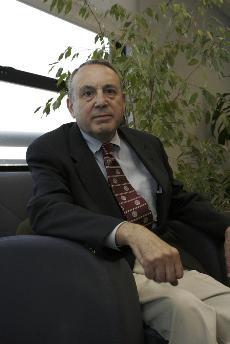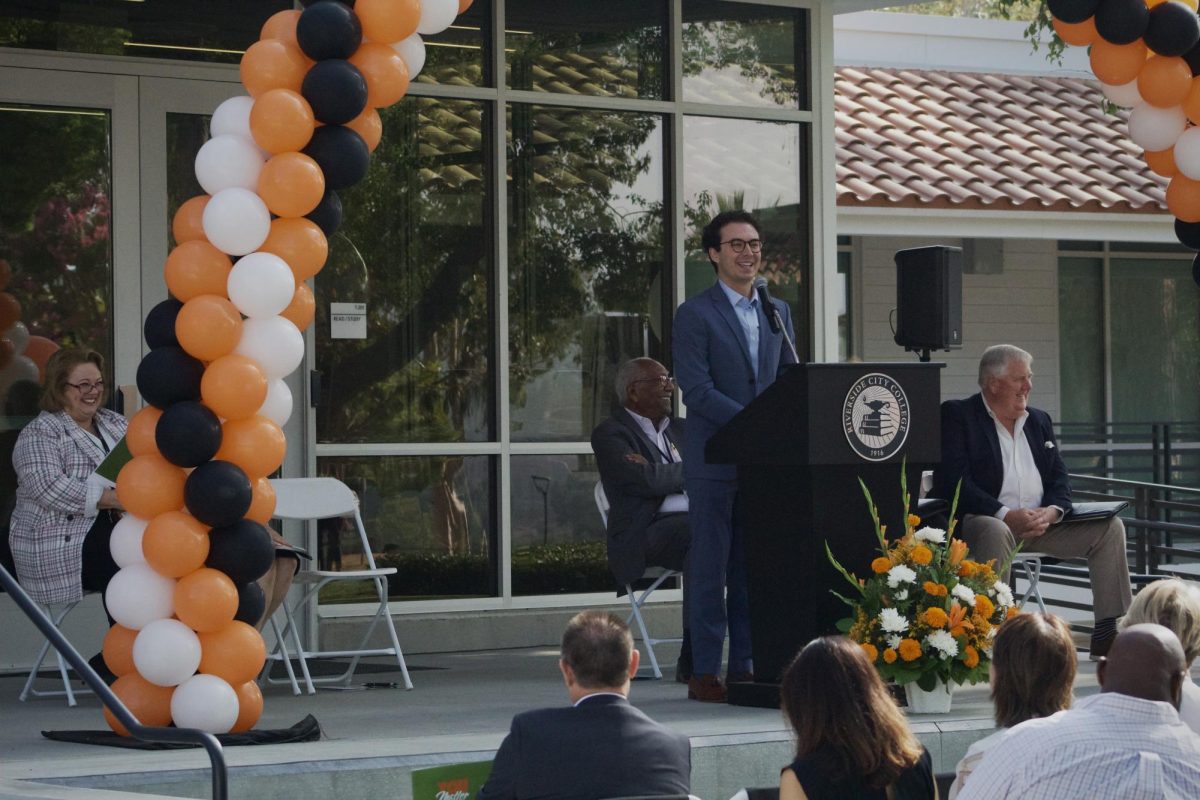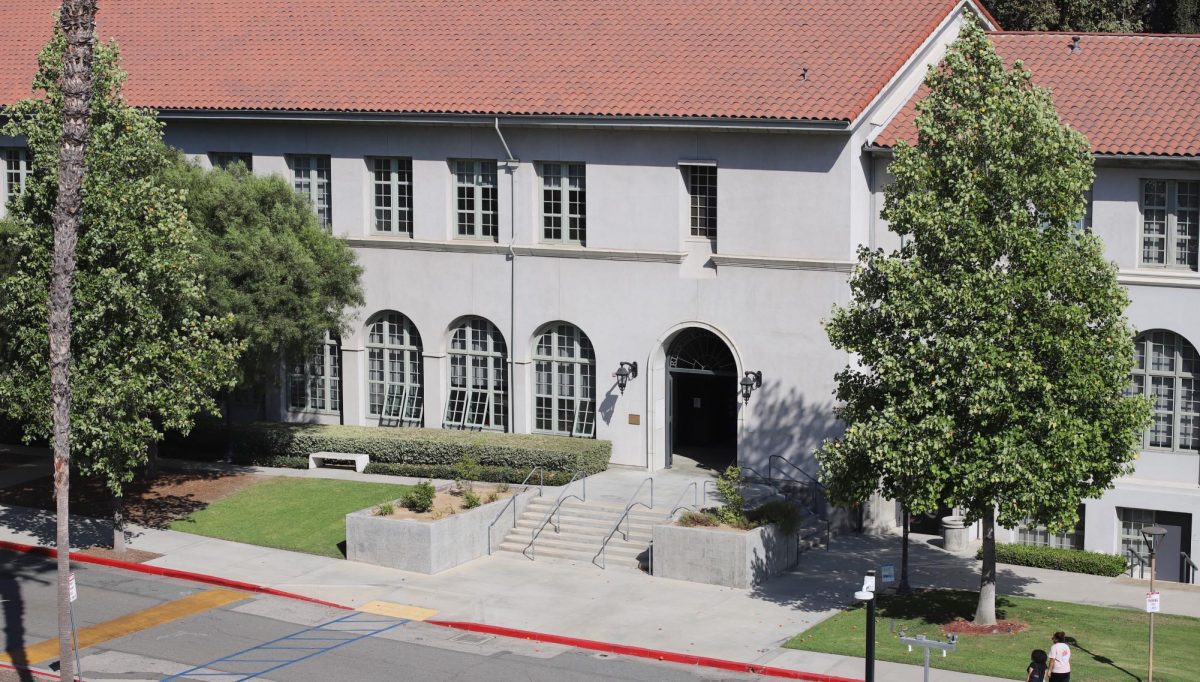By Daniel Segraves

RCC Chancellor Salvatore Rotella, soon to retire from RCC. (Christopher Ullyott)
By Daniel Segraves
A legend of the Riverside Community College District leaves office this summer, just before RCCD faces its task of accreditation.
Chancellor Salvatore Rotella will retire in August. In a special interview with Viewpoints, Rotella shared his thoughts, including why he has chosen to retire now.
“I chose to retire for personal and professional reasons,” Rotella said. “Isn’t it normal to retire when one has reached 72? I guess it’s a point in life where I believe a change is necessary… and that’s what I want to do.”
When asked about his favorite experience at the college, Rotella spoke of making the college what it is today.
“I think it was building up the colleges,” he said. “I think it was a much smaller place. Two were just sites, they were not campuses. I mean, obviously Riverside was a full-blown college. But the other two were just sites.”
Along with RCC’s past, Rotella sees big plans in the district’s future.
“But basically I think the most important thing is to maintain a strong academic posture and truly become three autonomous institutions,” Rotella said. He continued to say that students should come to the district “not to take courses but to take programs.”
The interim chancellor that will be leading the RCCD through this task is Jim Buysse, vice chancellor of Administration and Finance.
“I think Dr. Buysse will be…excellent…he’s been at the college pretty much as long as I have,” Rotella said. “He’s well versed in what’s going on and will make an excellent transitional candidate and from there on, it’s his own decision to seek the chancellorship on a regular basis or do whatever. But I’d say he’s one of the most qualified people in the state.”
Along with his great legacy, Rotella addressed some of his controversial issues in his time as chancellor of RCCD, but not with any remorse.
“I have no regrets,” he said. “Let me put it this way; that’s the negative side. I’ve been very positive and very fulfilled in terms of my experience here and I felt that I’ve done the best that can be done under the circumstances.”
Despite Rotella’s demeanor regarding his past, there have been numerous situations involving faculty problems.
One of these problems involved Frank “Chip” Stearns, instructor of Accounting and Business Administration.
Stearns was fired in 2002 under conditions that were allegedly falsified by the administration. According to those who protested his termination, the administration created grounds to fire Stearns after he discovered that the college was not in compliance with state financial laws.
Stearns was later rehired after a court case was settled in Stearns’ favor. Rotella denied that it was as big of a problem as it was made out to be.
“That’s a closed case,” Rotella said. “I closed that case. Chip Sterns and I have had a clear understanding. The case is in the mind of those who want to create unnecessary trouble. As far as I’m concerned, a mistake was made, that mistake has been rectified, I consulted with him in the process and… you should ask him. As far as I’m concerned, the wrong has been rectified.”
Stearns confirmed that the situation was “fairly settled” and refused to comment on who was truly at fault.
The more recent tensions regarding former President Daniel Castro were also addressed; Rotella held strong feelings toward his former colleague.
“I think I’ve been very up front about the situation,” Rotella said. “You know I’m only half of the issue here; the other half is called Castro. Frankly, it was his decision to step down. Maybe he was not happy in his situation here… (In my opinion) he found the reality of the job to be something that he had not considered when he took the job… It takes a good understanding of reality to function in a multi-college district…Maybe that’s something that he didn’t care for or something that disappointed him. I don’t know.”
After Rotella’s retirement was announced, questions arose concerning what would become of his office, located on the fourth floor of the Digital Library Auditorium.
“This would be the archive of the college,” Rotella said. “The library will grow. My stay here has only been temporary. It’s always been considered temporary. I like it very much because I enjoy being in the library, but I don’t belong here. The central administration has to get the hell out of here.”
Many faculty members also feel that the college was losing a part of what the school is. Richard Mahon, instructor of Humanities and president of the Academic Senate, spoke highly of Rotella.
“Whether there were good relations or not, most administrators in high positions are career bureaucrats,” Mahon said. “Rotella, on the other hand, continued to have imagination and dedication.”
Buysse shared his thoughts on the departure of the chancellor.
“In terms of his leadership, he is first and foremost a visionary,” Buysse said. “He looked for opportunities to increase and improve service, especially as regards new instructional programs and initiatives. He was also exceedingly effective in working with Sacramento and Washington in promoting RCC.”
Buysse also mentioned the caring side of the retiring chancellor.
“What you might call the soft side of Sal Rotella was huge,” he said. “Nothing he did in that regard was done for any reason other than a heartfelt need to try and help.”
Buysse also believed that Rotella’s greatest contribution pertained to the future of RCC.
“To me it has been the creation of what I call points of entry… new ways in which students might benefit from a community college education and new doors through which students can find the college,” he said. Buysse cited the Rubidoux Center and the Culinary program as just two examples of many of Rotella’s accomplishments.
Board of Trustee member Mark Takano was the only current trustee who served on the board when Rotella was initially hired by RCC and led the search that led to his employment. Takano spoke highly of Rotella’s history and his contribution to RCC through leadership.
“My time here has been intertwined with Rotella’s,” Takano said. “His time will go down as highly productive and significant. He brought numerous programs to RCC, including the Ford Asset and the Physician’s Assistant programs. Programs like these took considerable amounts of money, which the faculty did not always support. But because of these programs, students are almost guaranteed high-paying jobs.”
According to Takano, one of Rotella’s moments of great leadership included the passing of Measure C in 2004, giving RCC a $350 million bond.
“The voters approved the bond because they saw that the district was being managed well by Rotella,” Takano said.
When former RCC Board of Trustees member Grace Slocum was contacted to comment on Rotella’s retirement, she declined to give a statement.
Although there have been discrepancies in Rotella’s past , it can be established unanimously that Rotella’s retirement is the end of an era.
Read the full interview with Rotella here
Read the staff editorial on Rotella here















